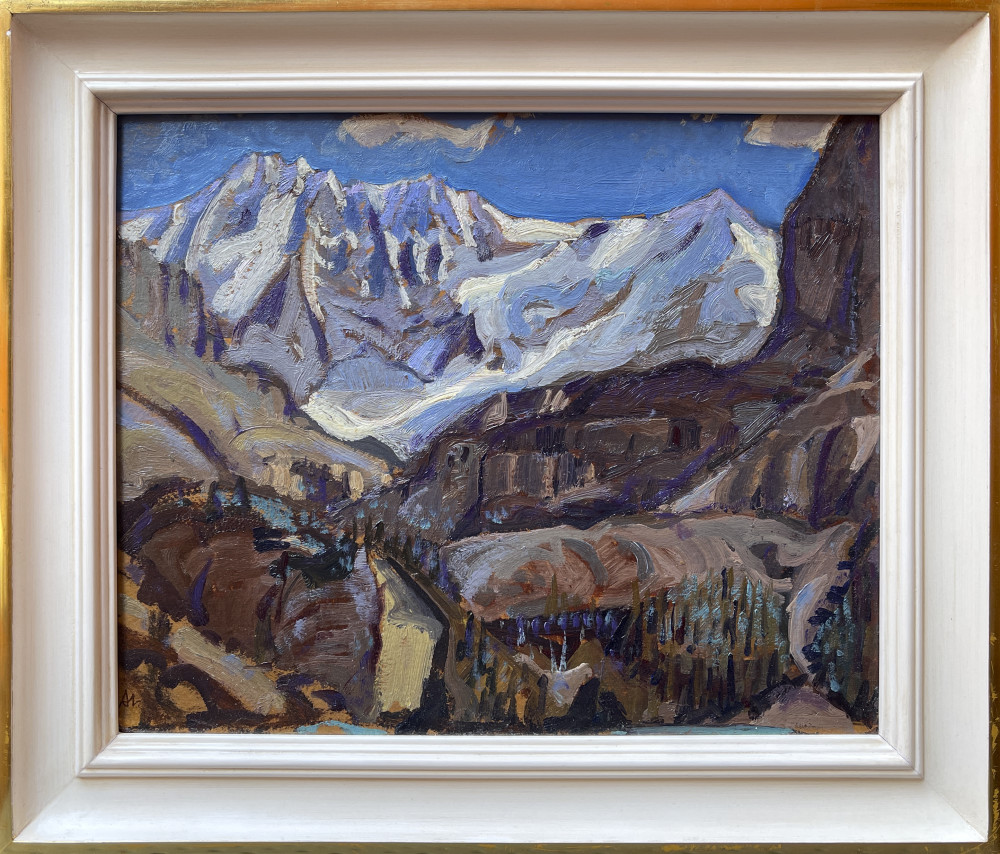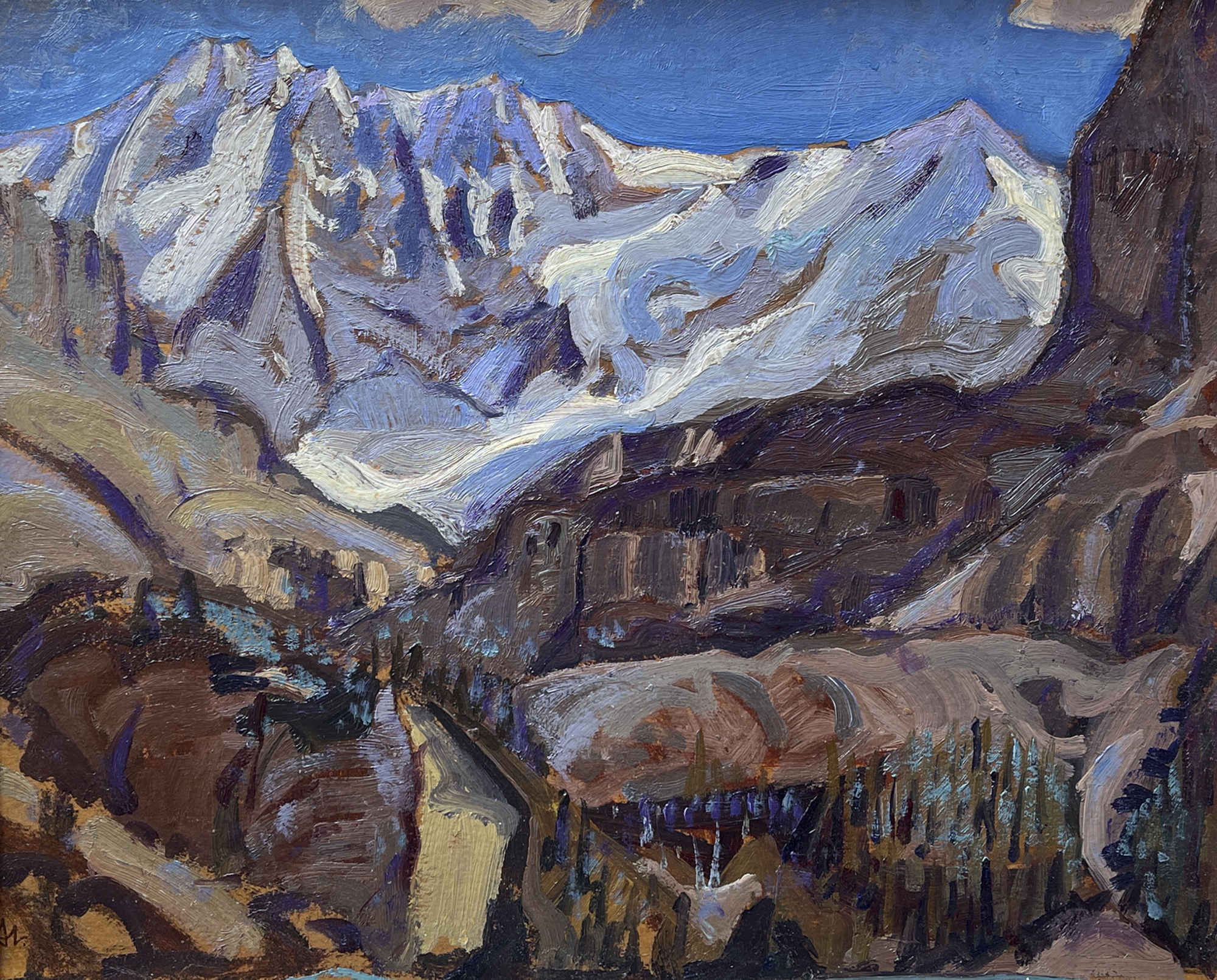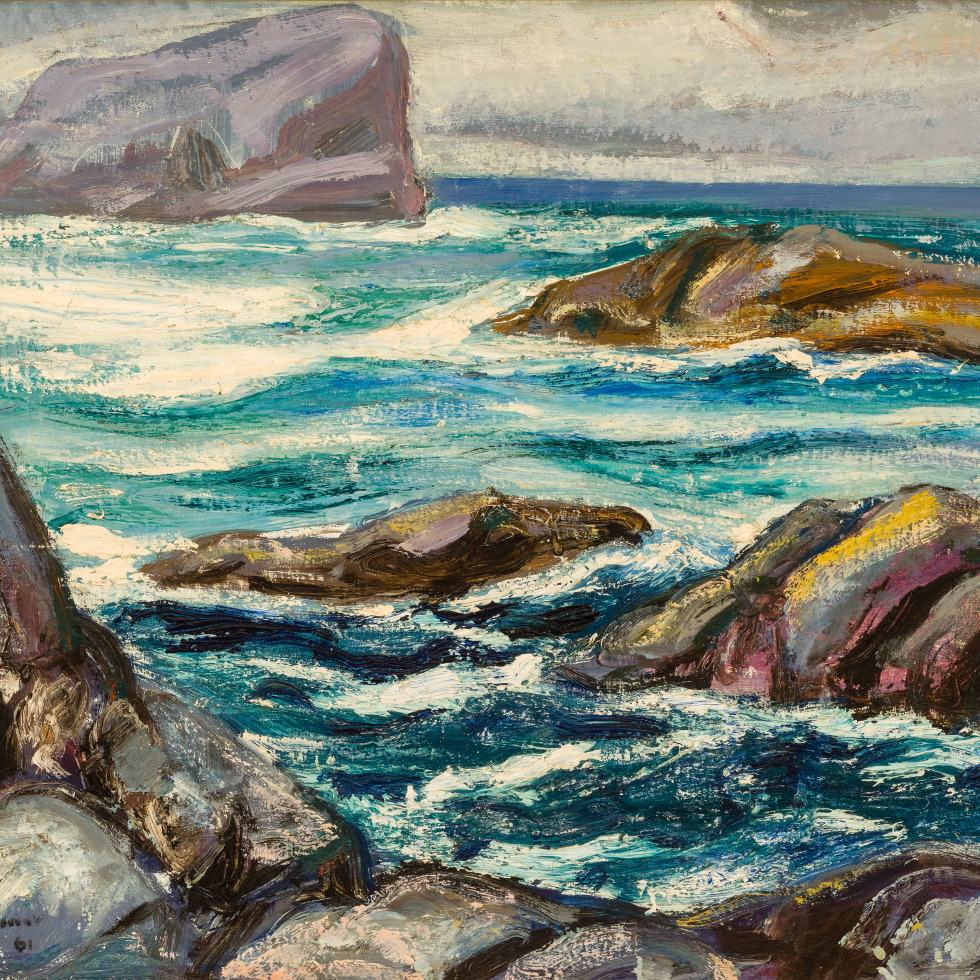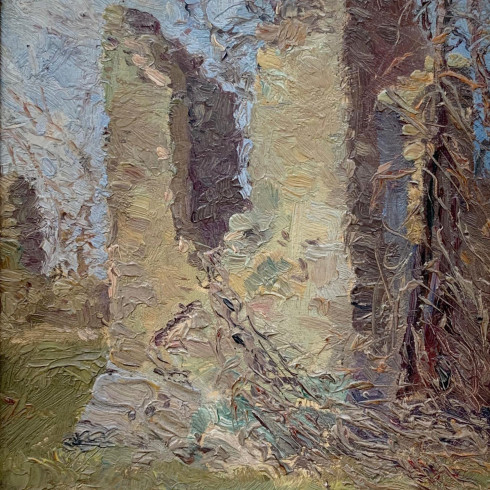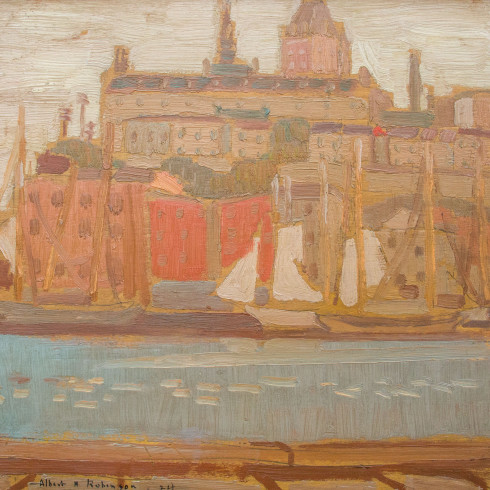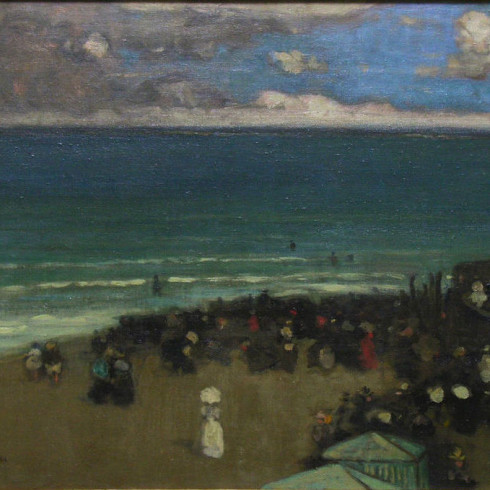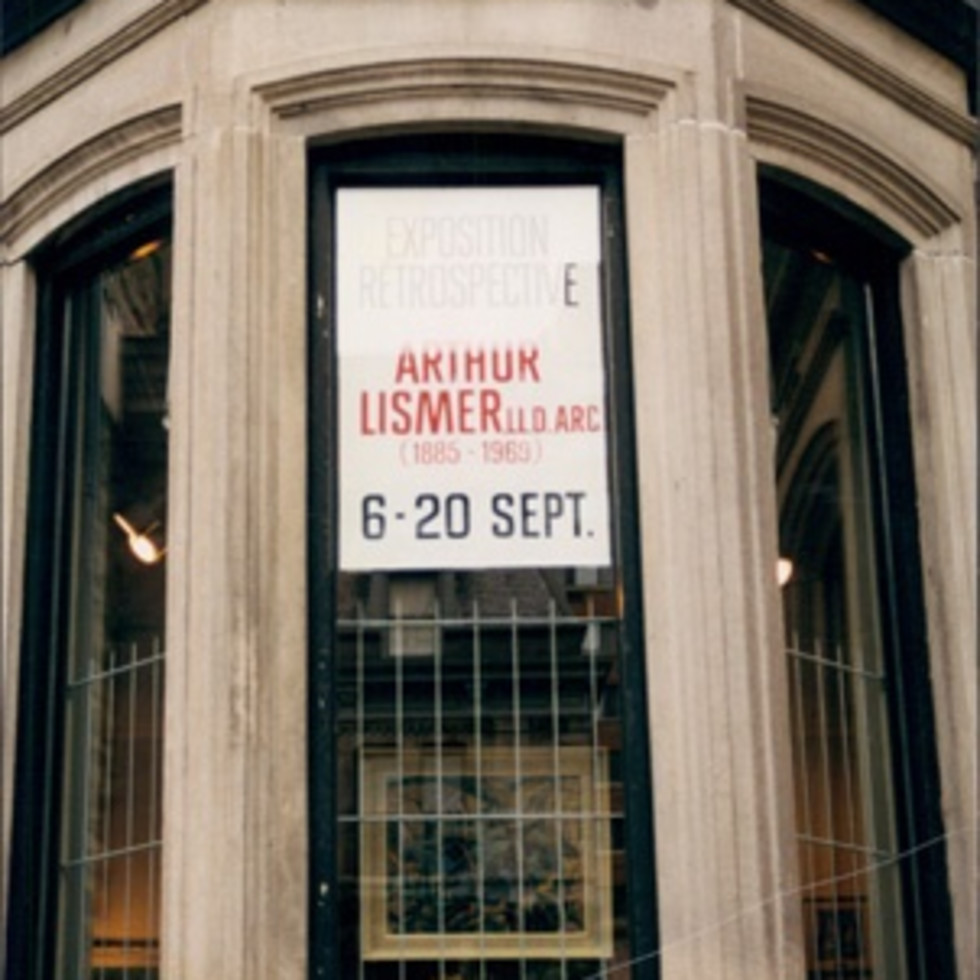Ventes notoires
Lake O'Hara, Canadian Rockies, 1928
Oil on panel
12 7/8 x 15 3/8 in
32.7 x 39.1 cm
32.7 x 39.1 cm
Sold
Inscriptions
Initialized, 'A.L.' (lower left); inscribed, 'L. O'Hara / Lake O'Hara / Canadian Rockies/ 650.00' (verso, centre)Provenance
Acquired from the artist;Sotheby Parke-Bernet Toronto, Oct. 1977, Lot 63;
Walter Wardlaw Esq., Ottawa;
Galerie Walter Klinkhoff Inc., Montreal;
Private collection, Montreal
Our most recent acquisition is Arthur Lismer's painting, Lake O’Hara, Canadian Rockies, 1928. For purposes of composition, in order to capture the majesty of the peaks set against the sky, Lismer eliminated all but a sliver of the lake itself. Arthur Lismer himself contributed simply the title “Lake O’Hara, Canadian Rockies”.
Doug MacLean, our distinguished colleague at Canadian Art Gallery in Canmore, Alberta, and also a veteran backcountry skier, hiker and custodian of huts with The Alpine Club of Canada, generously provided us with a documentary description of the composition.
“Lefroy is on the extreme left, then going towards the middle is Mt. Yukness, and behind the big rock on the right side which is Mt Hungabee would be Ringrose Pk. When you hike up to Abbot Pass which is directly below Lefroy (there is a 100 year old Alpine Club hut there, built by the swiss guides with stone) that is when you see Lefroy as a solitary peak, the highest peak in the view. Lismer certainly would have climbed to Abbot Pass to get that view. A bit further out of view in this picture is Mt. Victoria. MacDonald in general stayed lower, except he did climb Mt. Odaray...for his paintings of the Cathedral valley and more. He liked to paint from the Hungabee ledges too, looking north... ‘Above Lake O'Hara’ is a popular way to title this view.”
Since its earliest days, the Canadian Pacific Railway has had a large footprint in the development of art in Canada. It is precisely and exclusively the CPR’s concept of promoting business in their hotels by organizing music and craft festivals that brought Arthur Lismer to the Rockies in 1928. As he had designed a number of sets for Quebec City’s Canadian and Folk Song and Handicraft Festival, largely centred in and around CP’s Chateau Frontenac Hotel in late May of 1928, Lismer was employed to do the same for CP’s Banff Springs Hotel’s Highland Gathering and Scottish Music Festival held at the end of August (August 31 to September 3).
This visit to Canada’s Rocky Mountains in 1928 resulted in an extraordinary and powerful legacy in his oeuvre. In writing of Lismer’s sketching at Moraine Lake and Lake O’Hara, John McLeish wrote that the artist, “...was stirred by the epic majesty of the great ranges and by the vast sweep of nature...”. (1) When Lismer returned to Toronto, a number of the oil sketches painted in the Rockies he resolved on large canvases in order to capture the magnitude and scale of the vistas and weather he experienced. Hamilton Art Gallery’s The Glacier (Glacier Above Moraine Lake), London Ontario’s The Glacier, Moraine Lake also known as High Altitude and The Montreal Museum of Fine Arts’ Cathedral Mountain are outstanding examples.
It was once at Banff that Arthur Lismer continued on to Yoho National Park where CP had built the Lake O’Hara Lodge only a couple of years earlier. Lisa Christensen records from the Lodge that the Lismers, Arthur, Esther and young Marjorie were registered as guests on August 20, 1928. If one assumes that the Lismer’s would have returned to the Banff Springs Hotel for the beginning of the festival, this important sketch dates to sometime between August 20 and the 31st of 1928.
Emphasizing CP’s contribution to Canadian art by offering accessibility to Yoho with the construction of the Lodge at Lake O’Hara, Lisa Christiansen’s research of the Lodge’s registry for the summer of 1928 shows that Mr. & Mrs. Lawren Harris along with their son Lawren P. Harris had been at the lodge in mid July and J.E.H. MacDonald checked in on September 1.
We strongly encourage collectors of important fine art to purchase “Lake O’ Hara”, a rare and handsome testimony to Group of Seven member Arthur Lismer’s painting in the Rockies.
Notes
1. McLeish, John A.B. 1973. September gale: a study of Arthur Lismer of the Group of Seven. Toronto: J. M. Dent & Co., p. 109.
References
Christensen, Lisa, Lawren Harris and A. Y. Jackson. 2000. A hiker's guide to the Rocky Mountain art of Lawren Harris. Calgary, Alta: Fifth House, p. 85.
Sheedy, Erin. 2014. Performing the Canadian ‘Mosaic’. Juliette Gauthier, Florence Glenn and the CPR Festivals of Quebec City. Thesis submitted to the Faculty of Graduate and Postdoctoral Studies School of Music, Faculty of Art, University of Ottawa, p. 145.
Doug MacLean, our distinguished colleague at Canadian Art Gallery in Canmore, Alberta, and also a veteran backcountry skier, hiker and custodian of huts with The Alpine Club of Canada, generously provided us with a documentary description of the composition.
“Lefroy is on the extreme left, then going towards the middle is Mt. Yukness, and behind the big rock on the right side which is Mt Hungabee would be Ringrose Pk. When you hike up to Abbot Pass which is directly below Lefroy (there is a 100 year old Alpine Club hut there, built by the swiss guides with stone) that is when you see Lefroy as a solitary peak, the highest peak in the view. Lismer certainly would have climbed to Abbot Pass to get that view. A bit further out of view in this picture is Mt. Victoria. MacDonald in general stayed lower, except he did climb Mt. Odaray...for his paintings of the Cathedral valley and more. He liked to paint from the Hungabee ledges too, looking north... ‘Above Lake O'Hara’ is a popular way to title this view.”
Since its earliest days, the Canadian Pacific Railway has had a large footprint in the development of art in Canada. It is precisely and exclusively the CPR’s concept of promoting business in their hotels by organizing music and craft festivals that brought Arthur Lismer to the Rockies in 1928. As he had designed a number of sets for Quebec City’s Canadian and Folk Song and Handicraft Festival, largely centred in and around CP’s Chateau Frontenac Hotel in late May of 1928, Lismer was employed to do the same for CP’s Banff Springs Hotel’s Highland Gathering and Scottish Music Festival held at the end of August (August 31 to September 3).
This visit to Canada’s Rocky Mountains in 1928 resulted in an extraordinary and powerful legacy in his oeuvre. In writing of Lismer’s sketching at Moraine Lake and Lake O’Hara, John McLeish wrote that the artist, “...was stirred by the epic majesty of the great ranges and by the vast sweep of nature...”. (1) When Lismer returned to Toronto, a number of the oil sketches painted in the Rockies he resolved on large canvases in order to capture the magnitude and scale of the vistas and weather he experienced. Hamilton Art Gallery’s The Glacier (Glacier Above Moraine Lake), London Ontario’s The Glacier, Moraine Lake also known as High Altitude and The Montreal Museum of Fine Arts’ Cathedral Mountain are outstanding examples.
It was once at Banff that Arthur Lismer continued on to Yoho National Park where CP had built the Lake O’Hara Lodge only a couple of years earlier. Lisa Christensen records from the Lodge that the Lismers, Arthur, Esther and young Marjorie were registered as guests on August 20, 1928. If one assumes that the Lismer’s would have returned to the Banff Springs Hotel for the beginning of the festival, this important sketch dates to sometime between August 20 and the 31st of 1928.
Emphasizing CP’s contribution to Canadian art by offering accessibility to Yoho with the construction of the Lodge at Lake O’Hara, Lisa Christiansen’s research of the Lodge’s registry for the summer of 1928 shows that Mr. & Mrs. Lawren Harris along with their son Lawren P. Harris had been at the lodge in mid July and J.E.H. MacDonald checked in on September 1.
We strongly encourage collectors of important fine art to purchase “Lake O’ Hara”, a rare and handsome testimony to Group of Seven member Arthur Lismer’s painting in the Rockies.
Notes
1. McLeish, John A.B. 1973. September gale: a study of Arthur Lismer of the Group of Seven. Toronto: J. M. Dent & Co., p. 109.
References
Christensen, Lisa, Lawren Harris and A. Y. Jackson. 2000. A hiker's guide to the Rocky Mountain art of Lawren Harris. Calgary, Alta: Fifth House, p. 85.
Sheedy, Erin. 2014. Performing the Canadian ‘Mosaic’. Juliette Gauthier, Florence Glenn and the CPR Festivals of Quebec City. Thesis submitted to the Faculty of Graduate and Postdoctoral Studies School of Music, Faculty of Art, University of Ottawa, p. 145.



